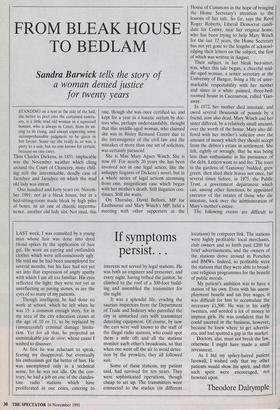If symptoms
persist. .
LAST week, I was consulted by a young man whose hair was done into dyed blond spikes by the application of hair gel. He wore an earring and outlandish clothes which were self-consciously ugly. He told me he had been unemployed for several months, but his face had not yet set into that expression of angry apathy with which I am all too familiar. His eyes reflected the light: they were not yet as unreflecting as paving stones, as are the eyes of so many of my patients.
Though intelligent, he had done no work at school, which he left when he was 15: a common enough story, for in my area of the city education ceases at the age of 10 or 11, to be replaced by (unsuccessful) criminal damage limita- tion. Yet for all that, he projected an unmistakable joie de vivre, whose cause I wished to discover.
At first he was reluctant to speak, fearing my disapproval, but eventually his enthusiasm got the better of him. He was unemployed only in a technical sense, for he was not idle. On the con- trary, he had a job on one of the clandes- tine radio stations which have proliferated in our cities, catering to interests not served by legal stations. He was both an engineer and presenter, and every night, having bribed the janitor, he climbed to the roof of a 300-foot build- ing and assembled the transmitter for the night.
It was a splendid life, evading the saurian inspectors from the Department of Trade and Industry who patrolled the city in unmarked cars with transmitter detecting equipment. Of course, by now the cars were well known to the staff of the illegal radio stations, who could spot them a mile off; and all the stations monitor each other's broadcasts, so that when one went off the air to avoid detec- tion by the prowlers, they all followed suit.
Some of these stations, my patient said, had survived for ten years. They were sophisticated operations, though cheap to set up. The transmitters were connected to the studios (in different locations) by computer link. The stations were highly profitable: local merchants, club owners and so forth paid £200 for brief advertisements, and the owners of the stations drove around in Porsches and BMWs. Indeed, so profitable were the stations that they were able to broad- cast religious programmes for the benefit of public morals.
My patient's ambition was to have a station of his own. Even with his unem- ployment benefit and tax free wages, it was difficult for him to accumulate the necessary £1,500. He was in his early twenties, and needed a lot of money to impress girls. He was confident that he could succeed in the business, however, because he knew where to get advertis- ers, and had spotted a gap in the market.
Doctors, alas, must not break the law, otherwise I might have made a small investment.
As I bid my spikey-haired patient farewell, I wished only that my other patients would show his spirit, and that such spirit were encouraged, not frowned upon.
Theodore Dalrymple










































































 Previous page
Previous page